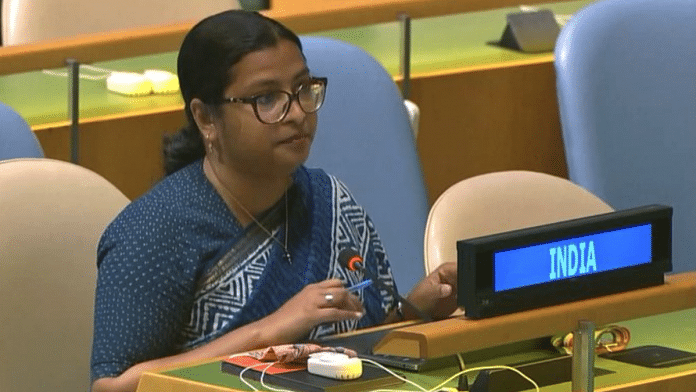United Nations: Slamming Pakistan, India said the country continues to foment a “culture of violence” at home and across its borders as it hit out at Islamabad for using the platform of the United Nations for hate speech against it.
“A Culture of Peace is not just an abstract value or principle to be discussed and celebrated in conferences, but needs to be actively built into global relationships between and among member states,” First Secretary in India’s Permanent Mission to the UN Vidisha Maitra said in the UN General Assembly Tuesday during the high-level forum on the Culture of Peace ‘Transformative role of the Culture of Peace: Promoting Resilience and Inclusion in Post-COVID Recovery’.
“We have witnessed yet another attempt today by the delegation of Pakistan to exploit a UN platform for hate speech against India, even as it continues to foment a ‘culture of violence’ at home and across its borders. We dismiss and condemn all such efforts,” she said.
India’s strong response came after Islamabad’s envoy to the UN Munir Akram raked up the issue of Jammu and Kashmir and spoke about the late pro-Pakistan leader Syed Ali Shah Geelani in his remarks in the General Assembly hall that focussed almost entirely on India and not on the forum’s theme.
Maitra said there can be no doubt that terrorism, which is a manifestation of intolerance and violence, is the antithesis of all religions and cultures. “The world should be concerned by terrorists who use religion to justify these acts and those who support them in this quest,” she said.
Also read: Can’t have terrorist camps again in Afghanistan, will directly impact India, says Tirumurti
Underlining that India will continue to spread the message of humanity, democracy, and non-violence, she said India reiterates its call for the application of the principles of objectivity, non-selectivity, and impartiality to form the basis of discussions in the United Nations especially on the issue of religion.
“The United Nations including the UN Alliance of Civilizations and the Member States should refrain from selectivity on such issues which hinders a Culture of Peace,” she said.
While noting that the COVID-19 pandemic has underscored the interconnectedness and interdependence of humankind like never before, she said even during the pandemic, “we have witnessed an upsurge in intolerance, violence, and terrorism.
“Even in the midst of the pandemic, we face the ‘infodemic’ challenge which has been responsible for a rise in hate speech and in seeding hatred within communities,” she said.
Last year in June, India along with 12 countries had co-sponsored the Cross-Regional Statement on “Infodemic” in the Context of COVID-19 the first-of-its-kind statement by the UN Member States.
Maitra told the high-level forum that the principles of democracy, pluralism, compassion, cultural diversity, dialogue, and understanding form the basis of the Culture of Peace.
“India is called a country of ‘unity in diversity’. Our concept of pluralism is based on our ancient ethos of ‘Sarva Dharma Sambhav’ which means ‘equal respect for all faiths’,” she said, as she referred to the 1893 speech by India’s great philosopher Swami Vivekananda at the Parliament of World Religions in Chicago where he had impressed upon India’s civilisational ethos of accepting the greatness of all religions.
“India is not just the birthplace of Hinduism, Buddhism, Jainism, and Sikhism, but is also the land where the teachings of Islam, Judaism, Christianity, and Zoroastrianism have taken strong root,” she said.
“Culture of Peace is the cornerstone of any global order to build inclusive and tolerant societies. Since the adoption of the UN Declaration and Programme of Action in 1999 at Bangladesh’s behest, the Culture of Peace agenda has provided an effective blueprint for multilateral action to promote solidarity and understanding,” she said.—PTI
Also read: Instead of Taliban talks, India must stand up for Afghan resistance despite Panjshir fall



